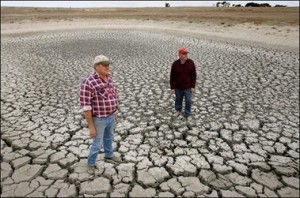Drought Across Three Continents Drops Crop Stockpiles, Raises Import Costs To $1.24 Trillion
 Stockpiles of the biggest crops will decline for a third year as drought parches fields across three continents, raising food-import costs already forecast by the United Nations to reach a near-record $1.24 trillion. [Businessweek]
Stockpiles of the biggest crops will decline for a third year as drought parches fields across three continents, raising food-import costs already forecast by the United Nations to reach a near-record $1.24 trillion. [Businessweek]Combined inventories of corn, wheat, soybeans and rice will drop 1.8 percent to a four-year low before harvests in 2013, the U.S. Department of Agriculture estimates. Crops in the U.S., the biggest exporter, are in the worst condition since 1988, heat waves are battering European crops and India’s monsoon rainfall already is 20 percent below normal. The International Grains Council began July by forecasting record harvests. It ended with a prediction for a 2 percent drop in output.
The speed of the destruction drove corn and soybean prices to records last month and wheat to a four-year high. For investors, crops are the best-performing commodities this year, and Goldman Sachs Group Inc., Macquarie Group Ltd. and Credit Suisse Group AG say the trend will continue. The UN expects food costs to rise, less than two years after record prices pushed 44 million people into extreme poverty and contributed to uprisings in North Africa and the Middle East.
Barack Obama promised to tackle climate change when he first ran for the White House four years ago, but – battling this summer for a second term – he speaks little of the issue even as the United States suffers through a drought of historic proportions, wild storms and punishing heat that topples temperature records almost daily. [Associated Press]
Maryland Sen. Barbara Mikulski says she is among a group of senators asking the Environmental Protection Agency to relax renewable fuel standards to require less corn. Mikulski says that will help ease corn supply shortages caused by drought conditions this year. [Washington Post]
Andrea Saul is the press secretary and chief spokesperson for Gov. Mitt Romney’s presidential campaign. But before Romney hired her, Saul worked for a DC-based public affairs and lobbying firm that worked to undermine climate science on behalf of corporations like ExxonMobil, according to a detailed new report from Greenpeace’s Polluter Watch project. [Mother Jones]
Across American agriculture, farmers and crop scientists have concluded that it’s too late to fight climate change. They need to adapt to it with a new generation of hardier animals and plants specially engineered to survive, and even thrive, in intense heat, with little rain. [Washington Post]
Wanxiang Group Corp., one of China’s biggest parts makers, offered a $450 million lifeline to A123 Systems Inc. a maker of advanced batteries for electric vehicles that received U.S.-government backing. [Wall Street Journal]
When the United Nations wanted to help slow climate change, it established what seemed a sensible system. But where the United Nations envisioned environmental reform, some manufacturers of gases used in air-conditioning and refrigeration saw a lucrative business opportunity. [New York Times]
More than 170 green businesses signed a letter to the prime minister, drafted by the Renewable Energy Association, calling for a public declaration of support for green energy and a resolution of the uncertainty that surrounds government plans for renewable power subsidies. [Guardian]
You can return to the main Market News page, or press the Back button on your browser.

